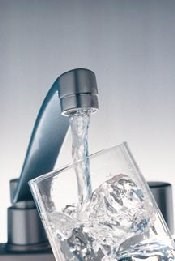NEWS RELEASE
GOVERNMENT OF CANADA
**************************** Government of Canada introduces legislation to improve drinking water quality in First Nation communities
OTTAWA - (May 26) - The Government of Canada is taking action to help ensure First Nations have safe, clean drinking water.
Today, Bill S-11, the Safe Drinking Water for First Nations Act was introduced in Parliament.
At the same time, the Government of Canada announced the two year extension of the First Nations Water and Wastewater Action Plan.
The Honourable Chuck Strahl, minister of Indian affairs and northern development and federal interlocutor for Métis and non-status Indians, together with the Honourable Leona Aglukkaq, minister of health, announced the introduction of a bill that will help safeguard drinking water in First Nation communities and a funding strategy to safeguard investments in drinking water.
This legislation would make it possible for the Government of Canada, in collaboration with First Nations, to move forward on development of federal regulations that will provide a comparable level of protection for drinking water in First Nation communities as enjoyed by other Canadians.
“First Nations should expect, as do all Canadians, to have access to safe, clean drinking water,” said Minister Strahl. “The introduction of legislation and the extension of the First Nations water and wastewater action plan will enable the Government of Canada to continue making tangible progress on its commitment to improving water conditions on-reserve."
The Government of Canada has maintained an open dialogue with First Nations in addressing water issues.
Throughout the last year, options for drinking water and wastewater were discussed with First Nations, regional First Nation Chiefs, First Nation organizations, provincial and territorial government officials, and other stakeholders.
“I am pleased that legislation is moving forward and that continued investments will be made under the First Nations water and wastewater action plan,” said Minister Aglukkaq. “This is a step in the right direction as it will provide us with another mechanism to help protect the health and safety of all First Nations living on-reserve.”
The extension of the First Nations water and wastewater action plan provides an additional $330 million over the next two years to continue to support First Nations in the provision of safe drinking water.
In addition to providing enhanced support for investments in water and wastewater facilities, the First Nations water and wastewater action plan is funding the national assessment of First Nations water and wastewater systems.
This assessment, which will conclude later this year, will provide a more accurate account of water and wastewater needs in First Nation communities.
Significant progress has been made in improving water and wastewater conditions across the country.
For example, in 2006, there were 193 high-risk drinking water systems.
Today, that number has been significantly reduced to 49 systems.
In addition, out of the 21 communities identified as priorities, which meant that the community had both a high-risk drinking water system and a drinking water advisory, 18 have been removed from the list.
All First Nations community sites now have access to a trained community-based water monitor or an environmental health officer to sample and test drinking water quality at tap.
In 2009, 92 percent of communities had access to portable test kits for on-site bacteriological analysis of drinking water, up from 56 percent in 2002.
Between 2006-2012 the Government of Canada will have invested over $2.3 billion in First Nations water and wastewater infrastructure.
This funding includes:
- Annual departmental investments of approximately $200 million;
- $270 million through the First Nations water management strategy;
- $60 million through the plan of action for drinking water;
- Approximately $660 million through the First Nations water and wastewater action plan; and
- $183 million through Canada's economic action plan.
****************************
